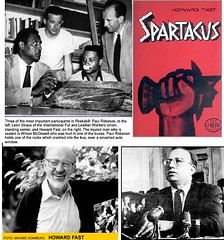Wednesday, April 19, 2006
Spartacus Synchronicity
Howard Fast, AUTHORS NOTE: "In January of 1950, I began to lay out in my mind and assemble material for a book on Spartacus and the servile insurrection which he led. I had always been fascinated by the story of this slave who shook great Rome to her very foundations and who became a deathless symbol of class resistance and class struggle. Not only was there, in our own time, the brave struggle against such odds of Rosa Luxemburg and Karl Liebknecht and their League of Spartacus; but through the centuries the name of Spartacus was always on the lips of the most oppressed, the most wretched, and yet the most militant elements of society. I read a great deal; I struggled with the material, as writers do; and then, in April of that year, I began to write. Shortly afterwards, I was sent to prison, where I found that an American jail is not conducive to creative writing. But l continued my reading and my reconstruction of a background for the story. However, in that time, my concept of what I wanted to do changed. The storm of Korea began while I was in jail; a catalyst had come into the history of my own time and my own land, and living with the price one pays for trying to write truthfully, I decided that I would have to write what most needed to be written. Thus, for two months after I came out of jail, I worked on a narrative account of the Peekskill incident. I finished that, but Spartacus still lived with me. He was no ghost that one could easily set aside - but rather did he more and more take on meaning and purpose for our own time." I was up at my house in Lake Peekskill yesterday and I noticed how the sight (less than a mile from the house and Peter Kendzor's as well) was the scene of the famous Peekskill Riots of 1949. There's a lot of synchronicity involved: The author of Spartacus, Howard Fast, was a prime organizer of the Paul Robeson concert which triggered the riots. Leon Straus, the grandfather of the beautiful Allegra Straus (with whom I had the pleasure of once working with) was in charge of security for the second concert. There was also a sizable involvement of progressive Harlem residents in planning and defending the event. Of course one of heroes, Paul Robeson was at the forefront. The picture above has Robeson, Straus and Fast. Here's the full text of Fast's author's note, including a segment of Spartacus
Subscribe to:
Post Comments (Atom)







No comments:
Post a Comment